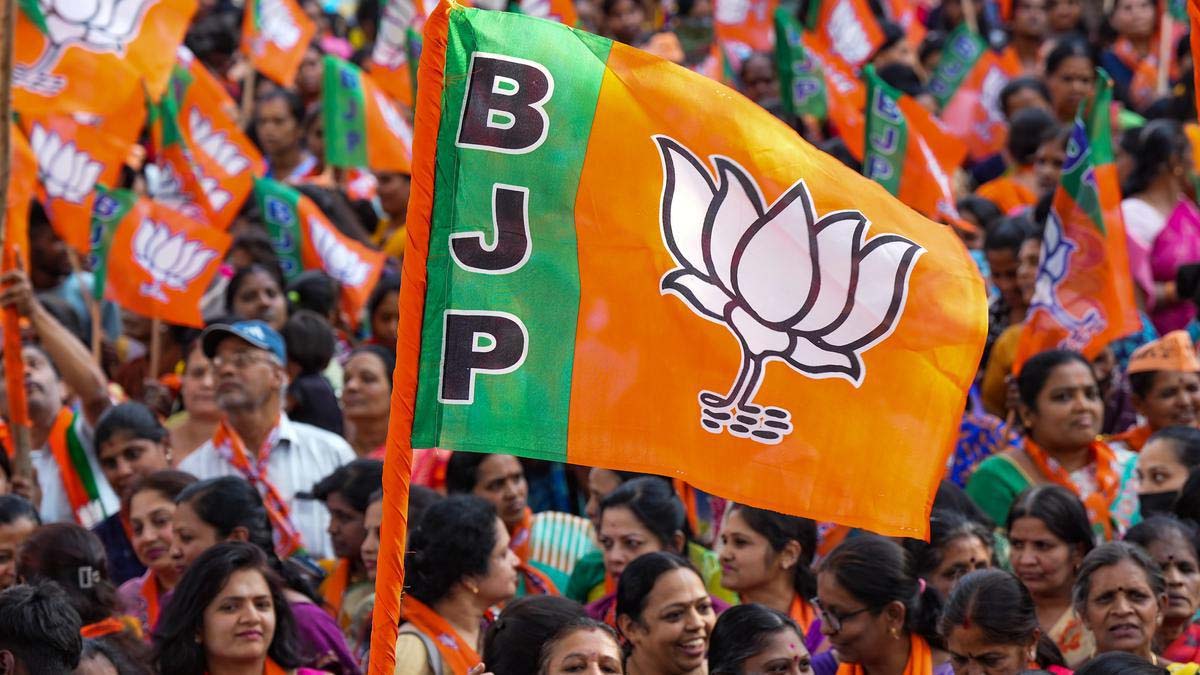Arun Srivastava
The BJP is keen on appointing a new national president by the end of December. The electoral process for the new president’s election is currently in motion. However, the contentious question of whether the RSS chief Mohan Bhagwat or Prime Minister Narendra Modi’s candidate will ultimately assume the office remains ambiguous. The discussions during the RSS national executive meeting in October, followed by Bhagwat’s interactions with senior BJP leaders and UP Chief Minister Yogi Adityanath, have fostered optimism within the saffron ecosystem about reaching an agreement by year-end.
With just a fortnight left until the month’s conclusion, the name of the next president is still pending announcement. There is uncertainty about whether the factions within the party have agreed upon a single candidate. Neither Mohan Bhagwat has provided any clues regarding the new leadership nor has Narendra Modi suggested a successor to current BJP president J P Nadda.
Nonetheless, senior BJP leaders share a common belief that this issue does not pose significant concerns for either the RSS or BJP, and a mutually acceptable candidate for both Bhagwat and Modi will be revealed soon. They highlight Modi’s tendency to maintain silence until the decisive moments approach, recalling how he appointed two relatively unknown figures as chief ministers of Haryana and Madhya Pradesh, surprising other BJP leaders only after their names were publicly announced.
These leaders express confidence that Modi will not take actions that would jeopardize the RSS or contradict its mission and values. He appears to be buying time. However, this strategy has raised suspicions among the RSS cadres regarding his intentions. Within saffron circles, there is a prevalent notion that the struggle for supremacy and control over the saffron ecosystem has entered a new phase. Insiders suggest that these recent developments indicate that the electoral outcomes may now be influenced by the Adani factor.
The assertive stance of the U.S. against the BJP—particularly allegations that the U.S. State Department was involved in targeted attacks against Modi and businessman Gautam Adani—has garnered attention from saffron leadership. This stance has made Modi’s political landscape precarious. In this context, Modi will need to emphasize strengthening his relationship with the U.S. administration. To achieve this, he requires a robust BJP organization and a harmonious relationship with the RSS. Choosing a candidate who is amiable to both him and acceptable to Mohan Bhagwat is a critical issue.
The recent discord among members of the INDIA bloc, particularly opposition from TMC and the Samajwadi Party regarding their ongoing discussions in Parliament, has provided major relief to the BJP, especially Modi. The TMC and SP’s resistance to Rahul Gandhi’s stance on Adani has effectively compelled Congress to refrain from direct attacks on Adani during their recent demonstrations outside Parliament. While the tone has softened, the urgency remains.
Adani is favored by the RSS, but the manner in which Modi has risked his reputation to shield him and his business does not sit well with Bhagwat. The RSS anticipates a more strategic approach from Modi concerning Adani, rather than creating the impression that the BJP government is entirely committed to safeguarding Adani’s interests. Notably, other non-Gujarati business entities, who also support Hindutva, have approached the RSS expressing concerns that the current government is favoring the Adani group at the expense of others. The RSS must address this, as these companies contribute to the funding of BJP-RSS initiatives.
In 2019, long before Amit Shah stepped down from the presidency, there was widespread knowledge about J P Nadda’s forthcoming replacement as president. This time, however, the identity of the new leader remains undisclosed. With the RSS chief exercising his influence to maintain the organization’s reputation, the circumstances have shifted dramatically. Throughout Modi’s decade in power, he has often overlooked the authority of the RSS, while Nadda operated under the Prime Minister’s guidance. In fact, during the Lok Sabha elections, Nadda even challenged the RSS’s relevance to the BJP.
During these ten years, Modi has cultivated a personality cult surrounding three principles: vyaktitva, vichardhara, sangathan (personality, ideology, organization). He is so enamored with this cult that he is hesitant to permit Bhagwat to appoint a close aide as the new president. Potential candidates circulating in party discourse include Vinod Tawde, Sunil Bansal, Shivraj Singh Chouhan, Manohar Lal Khattar, Vasundhara Raje, and Sanjay Joshi, the latter being viewed as Modi’s adversary.
Party insiders suggest that the RSS is interested in appointing a decisive and independent individual (one who is not intimidated by Modi and Shah) to the top party position. This sentiment is apparent in recent remarks by RSS leaders and ongoing discussions between RSS and BJP factions. Additionally, plans to restructure the party organization are underway. Thus, the roles of the BJP president and other organizational positions are also under consideration.
As the D-day approaches, the clamor for identifying the next president grows louder. The suspense is thickening; who will prevail in the supremacy battle, Bhagwat or Modi? The situation likely would not have escalated to this extent had Modi not chosen to assert himself as the saffron leader, thereby undermining the position and authority of RSS chief Mohan Bhagwat.
Since becoming the NDA leader, Modi has taken steps to consolidate his power within the party and win over some RSS officials. Initiatives like allowing government employees to join the RSS were aimed at mending rifts and easing grievances. The recent developments in Maharashtra represent yet another effort to bridge existing divisions. Modi is indeed navigating a complex situation. The Maharashtra incident has further strengthened Bhagwat’s position and authority. Judging by recent events in the saffron brigade, it seems the balance of power has subsequently shifted in Bhagwat’s favor. Modi cannot appoint a mere yes-man as the next president; the new leader must also be loyal to Mohan Bhagwat. Who that BJP leader will be remains an important question. (IPA)


Leave a Reply